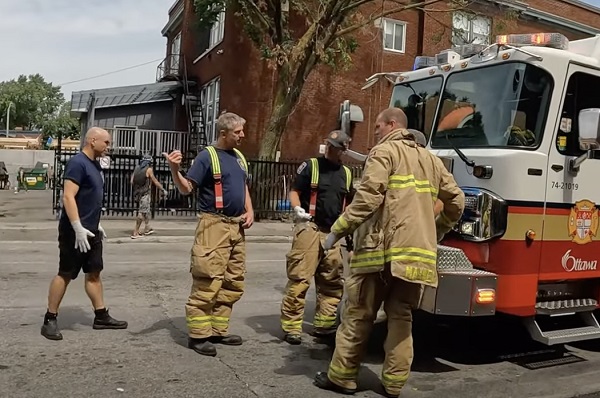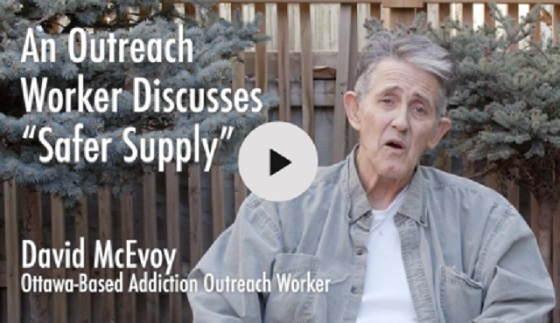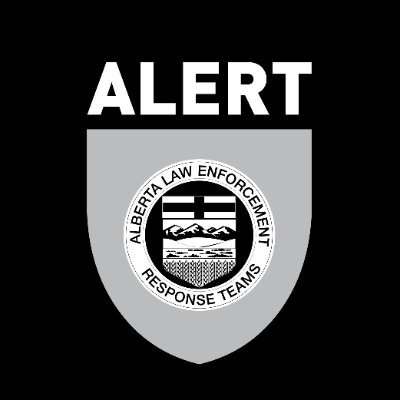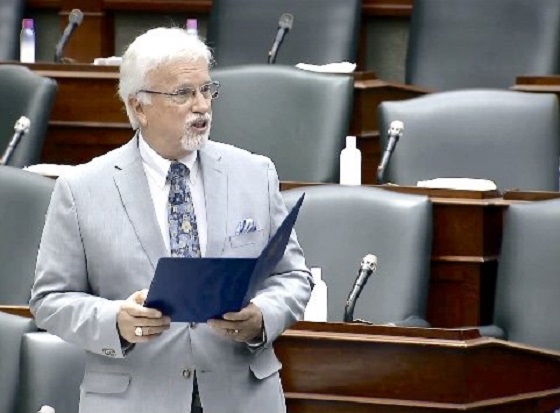Addictions
Liberal MP blasts Trudeau-backed ‘safe supply’ drug programs, linking them to ‘chaos’ in cities

First responders in Ottawa dealing with a crisis Fridayman 0102 / YouTube
From LifeSiteNews
‘There is certainly the perception by a lot of Canadians that a lot of downtown cores are basically out of control,’ Liberal MP Dr. Marcus Powlowski said, before pointing specifically to ‘safe supply’ drugs and injection sites.
A Liberal MP has seemingly taken issue with “safe supply” drug policies for increasing public disorder in Canada, policies his own party, under the leadership of Prime Minister Justin Trudeau, has endorsed.
During an April 15 health committee meeting in the House of Commons, Liberal MP Dr. Marcus Powlowski, while pressing the Royal Canadian Mounted Police (RCMP), stated that “safe supply” drug policies have caused Canadians to feel unsafe in downtown Ottawa and in other major cities across the country.
“There is certainly the perception by a lot of Canadians that a lot of downtown cores are basically out of control,” Powlowski said.
“Certainly there is also the perception that around places like safe supply, safe injection sites, that things are worse, that there are people openly stoned in the street,” he continued.
“People are getting cardio-pulmonary resuscitation performed on them in the street. There are needles around on the street. There is excrement on the street,” Powlowski added.
“Safe supply“ is the term used to refer to government-prescribed drugs that are given to addicts under the assumption that a more controlled batch of narcotics reduces the risk of overdose – critics of the policy argue that giving addicts drugs only enables their behavior, puts the public at risk, disincentivizes recovery from addiction and has not reduced, and sometimes even increased, overdose deaths where implemented.
Powlowski, who has worked as an emergency room physician, also stated that violence from drug users has become a problem in Ottawa, especially in areas near so-called “safe supply” drug sites which operate within blocks of Parliament Hill.
“A few months ago I was downtown in a bar here in Ottawa, not that I do that very often, but a couple of colleagues I met up with, one was assaulted as he was going to the bar, another one was threatened,” said Powlowski.
“Within a month of that I was returning down Wellington Street from downtown, the Rideau Centre, and my son who is 15 was coming after me,” he continued. “It was nighttime and there was someone out in the middle of the street, yelling and screaming, accosting cars.”
Liberal MP Dr. Brendan Hanley, the Yukon’s former chief medical officer, testified in support of Powlowski, saying, “My colleague Dr. Powlowski described what it’s like to walk around downtown Ottawa here, and certainly when I walk home every day, I encounter similar circumstances.”
“Do you agree this is a problem?” Powlowski pressed RCMP deputy commissioner Dwayne McDonald. “Do you agree for a lot of Canadians who are not involved with drugs, that they are increasingly unhappy with society in downtown cores which are this way? Do you want to do more about this, and if you do want to do more about this, what do you need?”
McDonald acknowledged the issue but failed to offer a solution, responding, “One of the success factors required for decriminalization is public support.”
“I think when you are faced with situations where, as we have experienced in our communities and we hear from our communities, where public consumption in some places may lead to other members of the public feeling at risk or threatened or vulnerable to street level crime, it does present a challenge,” he continued.
Deaths from drug overdoses in Canada have gone through the roof in recent years, particularly in British Columbia after Trudeau’s federal government effectively decriminalized hard drugs in the province.
Under the policy, which launched in early 2023, the federal government began allowing people within the province to possess up to 2.5 grams of hard drugs without criminal penalty, but selling drugs remained a crime.
The policy has been widely criticized, especially after it was found that the province broke three different drug-related overdose records in the first month the new law was in effect.
The effects of decriminalizing hard drugs in various parts of Canada has been exposed in Aaron Gunn’s recent documentary, Canada is Dying, and in U.K. Telegraph journalist Steven Edginton’s mini-documentary, Canada’s Woke Nightmare: A Warning to the West.
Gunn says he documents the “general societal chaos and explosion of drug use in every major Canadian city.”
“Overdose deaths are up 1,000 percent in the last 10 years,” he said in his film, adding that “[e]very day in Vancouver four people are randomly attacked.”
Addictions
Must Watch: Addiction worker estimates 90% of “safer supply” drugs resold on black market

“It’s just… it’s created more addicts,” says David McEvoy, an Ottawa-based outreach worker who specializes in overdose prevention.
|
|
“Safer supply” refers to the practice of prescribing free recreational drugs as an alternative to potentially-tainted street substances. While advocates claim that this practice saves lives, David McEvoy, an Ottawa-based addiction outreach worker, says that approximately 90% of clients are reselling their taxpayer-funded drugs on the street, leading to new addictions and relapses.
His testimony is consistent with the testimony of dozens of addiction experts, former drug users, and youth. You can read a summary of his interview in the National Post here.
Our content is always free – but if you want to help us commission more high-quality journalism, consider getting a voluntary paid subscription.
Addictions
Why can’t we just say no?

From the Frontier Centre for Public Policy
Drug use and violence have become common place in hospitals. Drug-addicted patients openly smoke meth and fentanyl, and inject heroin. Dealers traffic illicit drugs. Nurses are harassed, forced to work amidst the toxic fumes from drugs and can’t confiscate weapons. In short, according to one nurse, “We’ve absolutely lost control.”
“Defining deviancy down” is a cultural philosophy that emerged in the United States during the 1990s.
It refers to society’s tendency to adjust its standards of deviancy “down,” so that behaviours which were once unacceptable become acceptable. Over time, this newly- acceptable behaviour can even become society’s norm.
Of course, the converse must also be true — society looks down on those who label social behaviours “wrong,” deeming them moralistic, judgemental or simply out of touch with the realities of modern life.
Thirty years later, this philosophy is entrenched in British Columbia politics and policies. The province has become a society that cannot say “no” to harmful or wrong behaviours related to drug use. It doesn’t matter if you view drug use as a medical issue, a law-and-order issue, or both – we have lost the ability to simply say “no” to harmful or wrong behaviour.
That much has become abundantly clear over the past two weeks as evidence mounts that BC’s experiment with decriminalization and safe supply of hard drugs is only making things worse.
A recently-leaked memo from BC’s Northern Health Authority shows the deleterious impact these measures have had on BC’s hospitals.
The memo instructs staff at the region’s hospitals to tolerate and not intervene with illegal drug use by patients. Apparently, staff should not be taking away any drugs or personal items like a knife or other weapons under four inches long. Staff cannot restrict visitors even if they are openly bringing illicit drugs into the hospital and conducting their drug transactions in the hallways.
The public was quite rightly outraged at the news and BC’s Health Minister Adrian Dix quickly attempted to contain the mess by saying that the memo was outdated and poorly worded.
But his facile excuses were quickly exposed by publication of the very clearly worded memo and by nurses from across the province who came forward to tell their stories of what is really happening in our hospitals.
The President of the BC Nurses Union, Adriane Gear, said the issue was “widespread” and “of significant magnitude.” She commented that the problems in hospitals spiked once the province decriminalized drugs. In a telling quote, she said, “Before there would be behaviours that just wouldn’t be tolerated, whereas now, because of decriminalization, it is being tolerated.”
Other nurses said the problem wasn’t limited to the Northern Health Authority. They came forward (both anonymously and openly) to say that drug use and violence have become common place in hospitals. Drug-addicted patients openly smoke meth and fentanyl, and inject heroin. Dealers traffic illicit drugs. Nurses are harassed, forced to work amidst the toxic fumes from drugs and can’t confiscate weapons. In short, according to one nurse, “We’ve absolutely lost control.”
People think that drug policies have no impact on those outside of drug circles – but what about those who have to share a room with a drug-smoking patient?
No wonder healthcare workers are demoralized and leaving in droves. Maybe it isn’t just related to the chaos of Covid.
The shibboleth of decriminalization faced further damage when Fiona Wilson, the deputy chief of Vancouver’s Police Department, testified before a federal Parliamentary committee to say that the policy has been a failure. There have been more negative impacts than positive, and no decreases in overdose deaths or the overdose rate. (If such data emerged from any other healthcare experiment, it would immediately be shut down).
Wison also confirmed that safe supply drugs are being re-directed to illegal markets and now account for 50% of safe supply drugs that are seized. Her words echoed those of BC’s nurses when she told the committee that the police, “have absolutely no authority to address the problem of drug use.”
Once Premier David Eby and Health Minister Adrian Dix stopped denying that drug use was occurring in hospitals, they continued their laissez-faire approach to illegal drugs with a plan to create “safe consumption sites” at hospitals. When that lacked public appeal, Mr. Dix said the province would establish a task force to study the issue.
What exactly needs to be studied?
The NDP government appears to be uninformed, at best, and dishonest, at worst. It has backed itself into a corner and is now taking frantic and even ludicrous steps to legitimize its experimental policy of decriminalization. The realities that show it is not working and is creating harm towards others and toward institutions that should be a haven for healing.
How quickly we have become a society that lacks the moral will – and the moral credibility – to just to say “no.”
Susan Martinuk is a Senior Fellow with the Frontier Centre for Public Policy and author of Patients at Risk: Exposing Canada’s Health-care Crisis.
-

 Automotive2 days ago
Automotive2 days agoThe EV ‘Bloodbath’ Arrives Early
-

 Brownstone Institute2 days ago
Brownstone Institute2 days agoThe Numbers Favour Our Side
-

 Fraser Institute2 days ago
Fraser Institute2 days agoFederal government’s fiscal record—one for the history books
-

 Alberta2 days ago
Alberta2 days agoPrincipal at Calgary Elementary School charged with possession of child pornography
-

 Automotive1 day ago
Automotive1 day agoCanadian interest in electric vehicles falls for second year in a row: survey
-

 Alberta1 day ago
Alberta1 day agoAlberta threatens to fight Trudeau government restrictions on Canada’s plastics industry
-

 CBDC Central Bank Digital Currency2 days ago
CBDC Central Bank Digital Currency2 days agoA Fed-Controlled Digital Dollar Could Mean The End Of Freedom
-

 COVID-191 day ago
COVID-191 day agoFormer Canadian lawmaker has no regrets about refusing COVID shot despite losing his job






